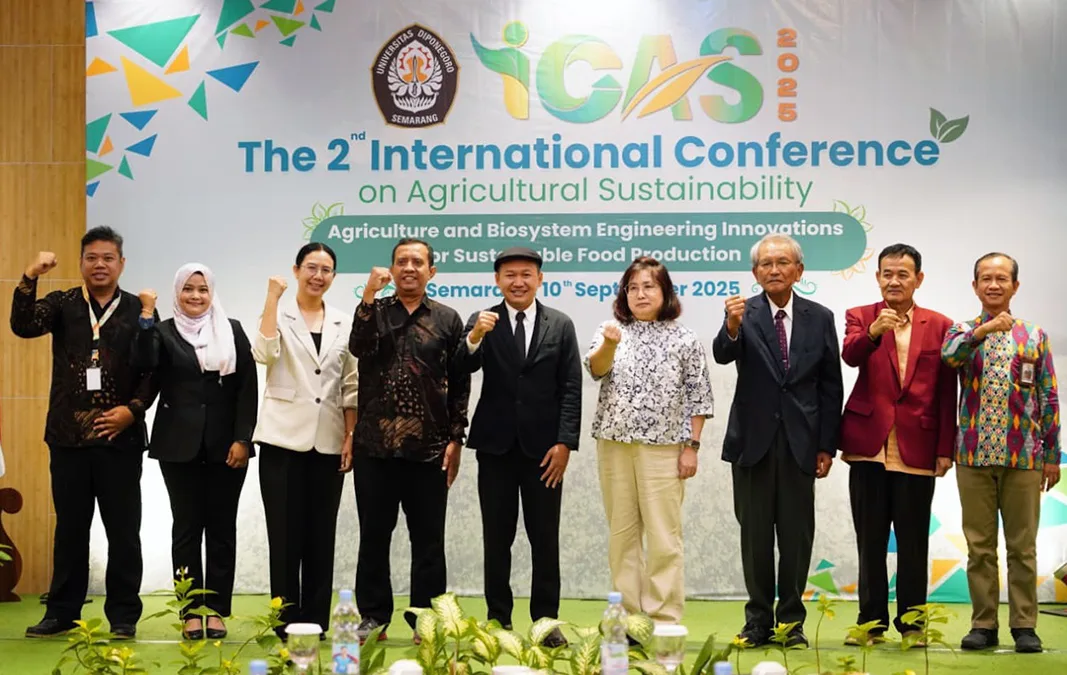UNDIP, Semarang (September 10, 2025) – Universitas Diponegoro (UNDIP), through the Agroecotechnology Study Program of the Faculty of Animal and Agricultural Sciences, successfully held the 2nd International Conference on Agricultural Sustainability (ICAS 2025) on September 10, 2025, at the Grand Candi Hotel Semarang and virtually.
The conference, themed “Agriculture and Biosystems Engineering Innovations for Sustainable Food Production,” featured 110 participants and 104 selected papers presented by academics and researchers from countries including Indonesia, Malaysia, Uzbekistan, Taiwan, Hungary, India, Sri Lanka, Turkey, Georgia, and the Philippines.
University leaders officially opened the event: Vice Rector for Research, Innovation, Cooperation, and Public Communication Wijayanto, S.IP., M.Si., Ph.D., and Vice Dean II of the Faculty of Animal and Agricultural Sciences Prof. Agus Setiadi, S.Pt., M.Si., Ph.D., accompanied by program heads from the faculty.
Five keynote speakers from leading Asian institutions shared strategic insights on global issues surrounding agricultural sustainability. Prof. Didik Wisnu Widjajanto (Universitas Diponegoro) highlighted the importance of organic farming practices to maintain soil fertility while reducing the negative impacts of intensive agriculture. He underscored the role of organic fertilizers, biofertilizers, and the enforcement of organic regulations and certifications as key factors in achieving sustainable food production systems.
From Japan, Prof. Yoshinori Yamamoto (Kochi University) discussed the impact of global warming on rice quality, explaining that higher temperatures during the grain-filling stage increase the number of immature grains. As an anticipatory step, Japan continues to develop heat-tolerant rice varieties to maintain production quality and stability.
Prof. Huey-Wen Chuang (National Chiayi University, Taiwan) presented strategies using microbe-based biostimulants to enhance horticultural crop resilience against abiotic stresses such as drought, salinity, heavy metals, and extreme temperatures. She cited studies on Pseudomonas bacterial strains that strengthen the growth of bananas and Phalaenopsis orchids while enhancing stress tolerance through jasmonate, auxin, and ABA hormone pathways.
Dr. Pattavipha Songkumarn (Kasetsart University, Thailand) addressed the threat of rice blast disease caused by Pyricularia oryzae, which can reduce yields by up to 30 percent. She noted that pathogen diversity often undermines resistance in rice varieties, making gene-based breeding with resistant traits like Pi9 and Pik essential. She also stressed vigilance against emerging fungal diseases such as brown spot (Bipolaris oryzae) and Exserohilum rostratum, which are becoming more aggressive under rising temperatures. Recent research, she said, shows abscisic acid (ABA) hormone involvement in rice defense mechanisms.
Concluding the keynote sessions, Dr. Nik Norasma Che’Ya (Universiti Putra Malaysia) emphasized the importance of digital transformation in paddy management through the use of remote sensing technology, UAVs, satellite imagery, and hyperspectral sensors to support precision agriculture. These technologies enable real-time crop health monitoring, early disease detection, more efficient nutrient management, and more accurate yield predictions. She also noted that biostimulants such as spermidine have proven effective in enhancing drought tolerance and boosting yields.
In addition to the keynote addresses, papers presented at the conference covered a wide range of fields, including agronomy, agribusiness, soil and land management, food technology, crop pest and disease management, and agricultural and biosystems engineering. All accepted papers will be published in proceedings and reputable Scopus-indexed international journals, ensuring broad accessibility to the global academic community.
Through ICAS 2025, Universitas Diponegoro reaffirmed its commitment to driving international collaboration in agriculture, strengthening knowledge exchange, and fostering innovative solutions to future sustainable food production challenges. The event also reinforced UNDIP’s growing reputation in agriculture, as reflected in its placement in the QS World University Rankings by Subject 2025 at 351–400 in Agriculture & Forestry. (Public Communication/ UNDIP/ FPP Team)










